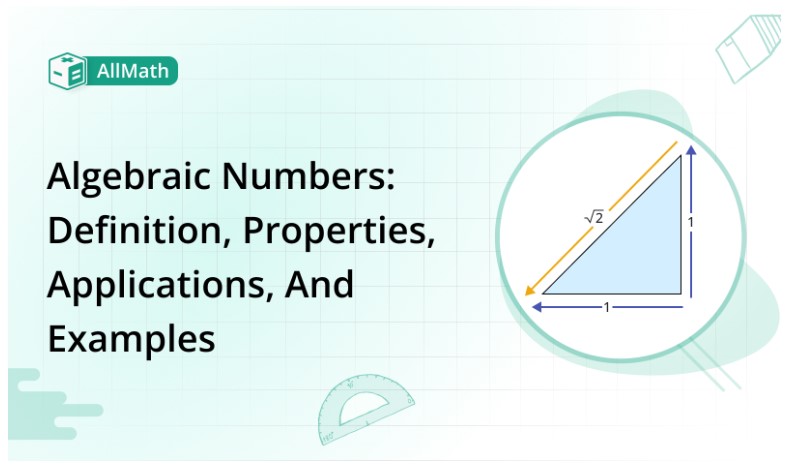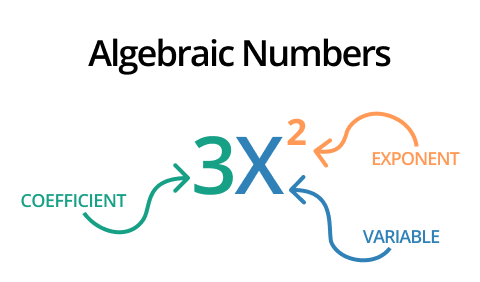To calculate result you have to disable your ad blocker first.
Algebraic Numbers: Definition, Properties, Applications, and Examples

Publish Date: 08 Aug, 2023
Table of Content
An algebraic number is a fundamental concept of mathematics that comes from the understanding of algebraic equations and number theory. An algebraic number confines a vast range of numbers, containing rational numbers, specific types of irrational numbers, and integers.
These numbers built a connection between the algebraic and analytic properties of numbers. Algebraic numbers also have different types of properties. By using the degree of algebraic numbers, we can classify these numbers.
Definition of an Algebraic Number
An algebraic number is a complex number that is a solution of a polynomial equation with integer coefficients. In simple words, a number ‘x’ is algebraic if it fulfills a polynomial equation of the form:
anxn + an-1xn-1 + an-2xn-2 + … + a1x + a0 = 0
where n is a non-negative integer and an, an-1, an-2, ... , a1, a0, are the integers. This equation is known as the minimal polynomial equation of the algebraic number ‘x’.

Properties of an Algebraic Number
The properties of Algebraic numbers are as follows:
Field structure
The set of algebraic numbers made a field called the field of algebraic numbers. The field of algebraic numbers means that we can subtract, add, multiply, and divide with the general properties of arithmetic operations (except 0).
Closure
The set of algebraic numbers is closed under arithmetic operations like subtraction, addition, multiplication, and division (excluding 0). This means that if we apply these operations to the arithmetic number of any of the sets then we get the arithmetic number as a result from the same set.
Minimal polynomial
An algebraic number is a minimal polynomial. This means that the min degree with an integer coefficient has the given algebraic as a root. The minimal polynomial is distinct for every algebraic number, and we can’t reduce it, which means that we cannot make factors into a polynomial of a lower degree with integer coefficients.
Transcendental numbers
The numbers which are not algebraic numbers are known as transcendental numbers. These numbers include ‘π’, ‘e’, etc. This means that not all complex numbers are algebraic numbers and the numbers which are not algebraic numbers cannot be expressed as a root of a polynomial equation with an integer coefficient.
Algebraic closure
Algebraic closure is an algebraic extension of a field that is algebraically closed, which means that every coefficient with a non-constant polynomial in the field has at least one root. In simple words, we can say that there exists an algebraic number.
Algebraic degree
Every algebraic number has a degree which is known as an algebraic degree. This degree is also known as the minimal degree of the polynomial. This degree shows the highest power of the polynomial.
Countability
Countability means that we can easily count algebraic numbers. We can easily make the one-to-one correspondence of algebraic numbers natural numbers and other than these numbers.
Difference between Algebraic numbers and Transcendental numbers
There is a big difference between algebraic numbers and transcendental numbers. Algebraic numbers are complex numbers that have the solution of polynomials but transcendental numbers are those complex numbers that don’t have any type of solution for polynomials.
Algebraic numbers can be expressed as a root of complex numbers with integer coefficients but transcendental numbers cannot be expressed as root of complex numbers with integer coefficients.
Applications of Algebraic Numbers
Some applications of algebraic numbers are as follows:
Physics
Physics is a major branch of science in which algebraic numbers play a vital role. Algebraic numbers play a role as the backbone of physics. Algebraic numbers are used for quantization in the different branches of physics.
Mathematical Analysis
Algebraic numbers also play a key role in mathematical analysis. These numbers are used to study the function's behavior and analyze the complex system.
Algebraic geometry
Algebraic numbers are also used in algebraic geometry.
Examples
Examples of algebraic numbers are as follows:
Rational numbers
The numbers which are in the form of p / q are known as algebraic numbers. For example, 1, 3 / 2, etc.
Integers
Integers are also known as algebraic numbers. For example, -3, - 2, -1, 1, 2, 3, 4, …, etc.
Square root
Numbers that are in the form of square roots are also known as algebraic numbers. For example, x2 – 5 = 0 etc.
Cube root
Numbers that are in the form of cube roots are also known as algebraic numbers. For example, x3 – 5 = 0 etc.
Conclusion
In this article, we've discussed the whole theory of algebraic numbers in which we explain what is an algebraic number, their basic properties, and the application used in our daily life and we try to explain them with the help of examples.

